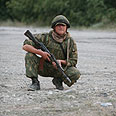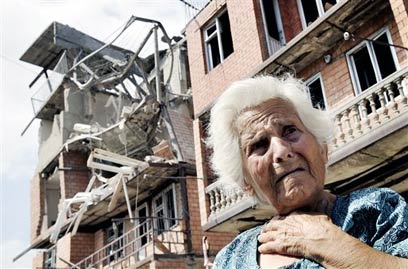
Russian soldier in Gori
Photo: Tzur Sheizaf

Russia's Lavrov
Photo: AFP
Russian FM: Forget Georgian territorial integrity
Explosions heard near Gori as Russian troop withdrawal from strategic Georgian city seems to collapse. Fragile ceasefire appears even shakier as Lavrov declares 'it is impossible to persuade South Ossetia and Abkhazia to agree with the logic that they can be forced back into the Georgian state'
Explosions were heard near Gori on Thursday as a Russian troop withdrawal from the strategic city seemed to collapse. A fragile ceasefire
appeared even more shaky as Russia's foreign minister declared that the world "can forget about any talk about Georgia's territorial integrity."
"One can forget about any talk about Georgia's territorial integrity because, I believe, it is impossible to persuade South Ossetia and Abkhazia to agree with the logic that they can be forced back into the Georgian state," Lavrov told reporters.
The declaration from Russian Foreign Minister Sergey Lavrov came simultaneously with the announcement that Russian President Dmitry Medvedev was meeting in the Kremlin with the leaders of Georgia's two separatist provinces.
Opinion
Orly Azoulay
In this war, Russia won, Georgia lost, and US was resoundingly defeated
At least five explosions were heard near Gori. It could not immediately be determined if the blasts were a renewal of fighting between Georgian and Russian forces, but they sounded similar to mortar shells and occurred after a tense confrontation between Russian and Georgian troops on the edge of the city.
The strategically located city is 15 miles south of South Ossetia, the separatist region where Russian and Georgian forces fought a brutal five-day battle. Russian troops entered Gori on Wednesday, after the two sides signed the cease-fire that called for their forces to pull back to the positions they held before the fighting started.
Georgia early Thursday said the Russians were leaving the city, but later alleged they were bringing in additional troops. Georgian government officials who had gone into the city for a possible handover left unexpectedly around midday, followed by a confrontation at a Russian checkpoint on Gori's outskirts that ended when Russian tanks sped toward the area and Georgian police forces retreated.
Some Georgian police said irregular fighters from South Ossetia had refused to leave Gori, where a BBC reporter saw them looting and burning Wednesday night.
The first of two planned US aid flights arrived in the Georgian capital of Tbilisi late Wednesday, carrying cots, blankets and medicine for refugees displaced by the fighting. The shipment arrived on a C-17 military plane, an illustration of the close US-Georgia military cooperation that has angered Russia.
Besides the hundreds killed since hostilities broke out, the United Nations estimates 100,000 Georgians have been uprooted; Russia says some 30,000 residents of South Ossetia fled into the neighboring Russian province of North Ossetia.
Gori was battered by sporadic Russian bombing before the cease-fire, with Russia saying it was targeting a military base near the city. The city, on Georgia's only significant east-west road, is only 60 miles west of Tbilisi.
The Russian troops' presence in Gori was viewed as a demonstration of the vulnerability of the capital.
Russian troops also appeared to be settling in elsewhere in Georgia.

Georgian resident on backdrop of bombed building (Photo: AP)
An APTN camera crew saw Russian soldiers and military vehicles parked Thursday inside the Georgian government's elegant, heavily-gated residence in the western town of Zugdidi. Some of the soldiers wore blue peacekeeping helmets, others wore green camouflage helmets, all were heavily armed. The scene underlined how closely the soldiers Russia calls peacekeepers are allied with its military.
"The Russian troops are here. They are occupying," Ygor Gegenava, an elderly Zugdidi resident told the APTN crew. "We don't want them here. What we need is friendship and good relations with the Russian people."
Georgia, bordering the Black Sea between Turkey and Russia, was ruled by Moscow for most of the two centuries preceding the 1991 breakup of the Soviet Union.
Secretary of State Condoleezza Rice was flying Thursday to France and then to Tbilisi to reinforce US efforts to "rally the world in defense of a free Georgia."
"This is not 1968 and the invasion of Czechoslovakia where Russia can threaten a neighbor, occupy a capital, overthrow a government and get away with it. Things have changed," Rice said in Washington on Wednesday.
Genocide probe launched
The Russian General Prosecutor's office on Thursday said it has formally opened a genocide probe into Georgian treatment of South Ossetians. For its part, Georgia this week filed a suit against Russia in the International Court of Justice, alleging murder, rape and mass expulsions in both provinces.More homes in deserted ethnic Georgian villages were apparently set ablaze Wednesday, sending clouds of smoke over the foothills north of Tskhinvali, capital of breakaway South Ossetia.
One Russian colonel, who refused to give his name, blamed the fires on looters.
Those with ethnic Georgian backgrounds who have stayed behind — like 70-year-old retired teacher Vinera Chebataryeva — seem increasingly unwelcome in South Ossetia.
As she stood sobbing in her wrecked apartment near the center of Tskhinvali, Chebataryeva said a skirmish between Ossetian soldiers and a Georgian tank had gouged the two gaping shell holes in her wall, bashing in her piano and destroying her furniture.
Janna Kuzayeva, an ethnic Ossetian neighbor, claimed the Georgian tank fired the shell at Chebataryeva's apartment.
"We know for sure her brother spied for Georgians," said Kuzayeva. "We let her stay here, and now she's blaming everything on us."
Pointing to her broken door, Chebataryeva said Ossetian soldiers broke into her apartment and started firing at the Georgian tank from her windows.
North of Tskhinvali, a number of former Georgian communities have been abandoned due to the intense fighting of the last few days. "There isn't a single Georgian left in those villages," said Robert Kochi, a 45-year-old South Ossetian.
But he had little sympathy for his former Georgian neighbors, whom he accused of trying to drive out Ossetians. "They wanted to physically uproot us all," he said. "What other definition is there for genocide?"















